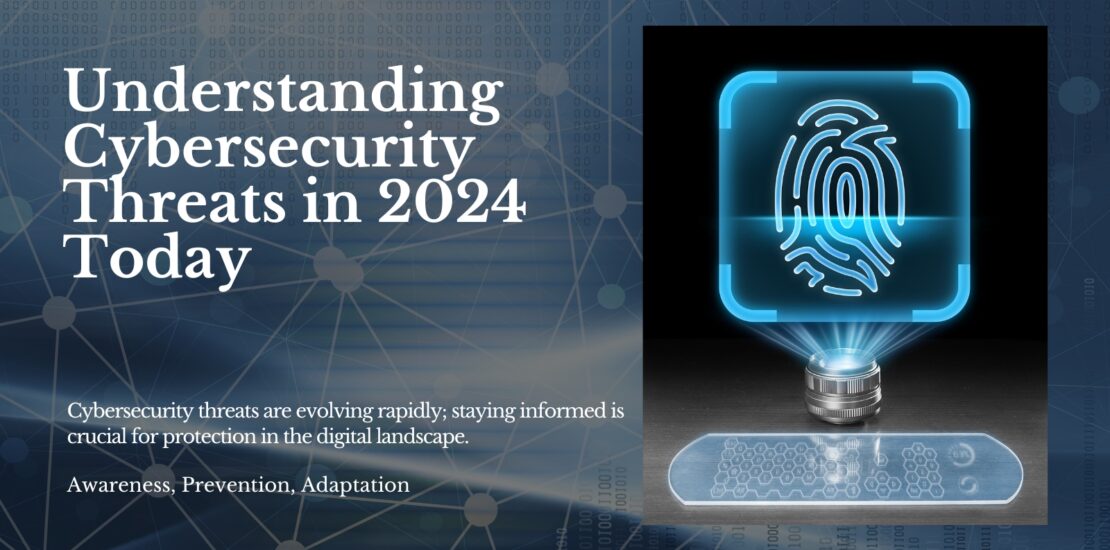- September 24, 2024
- Posted by: ibu Consulting
- Category: News

In 2024, the cybersecurity landscape is more challenging than ever before. With the rapid evolution of technology, cyber threats are becoming more sophisticated and dangerous, targeting individuals, corporations, and governments alike. For organizations and professionals alike, it’s critical to understand the key cybersecurity threats 2024 to safeguard sensitive data and protect critical infrastructures.
This blog will discuss the most pressing cybersecurity threats 2024 and provide essential insights into protecting your business and personal data.
1. Ransomware Attacks Continue to Evolve
Ransomware remains one of the most prominent cybersecurity threats 2024. Attackers are not only encrypting data but are also increasingly using “double extortion” tactics, threatening to release sensitive information if the ransom is not paid. These attacks now target critical sectors such as healthcare, finance, and energy.
How to Defend Against Ransomware:
- Regularly back up critical data and store it offline.
- Train employees to recognize phishing emails, a common vector for ransomware.
- Use advanced endpoint protection and intrusion detection systems.
2. Artificial Intelligence (AI)-Powered Attacks
As artificial intelligence becomes more integrated into cybersecurity, attackers are leveraging AI to automate and scale their attacks. AI-powered malware can now analyze a network, bypass security defences, and deliver payloads without human intervention. These advanced threats require new approaches in cybersecurity defence.
How to Defend Against AI-Powered Threats:
- Employ AI-driven security solutions to counteract AI-powered attacks.
- Continuously monitor network traffic for any unusual behavior.
- Implement a multi-layered security approach that includes behavioral analytics.
3. Supply Chain Attacks on the Rise
In 2024, attackers are increasingly targeting supply chains, where third-party vendors and partners are exploited to breach large organizations. These attacks are difficult to detect and mitigate because they originate from trusted suppliers, but they can have devastating effects.
How to Defend Against Supply Chain Attacks:
- Conduct thorough vetting and risk assessments of third-party vendors.
- Regularly audit your supply chain for security vulnerabilities.
- Establish clear protocols for managing third-party relationships and access to sensitive data.
4. Cloud Security Threats
With the widespread adoption of cloud computing, cloud security threats are more prevalent in 2024. Misconfigurations in cloud services, inadequate data encryption, and weak access controls continue to be exploited by cybercriminals. Moreover, shared responsibility models between cloud providers and users sometimes blur accountability.
How to Defend Against Cloud Threats:
- Ensure proper configuration of cloud services and implement strong encryption.
- Limit access to critical data and use identity and access management (IAM) tools.
- Regularly audit cloud service providers and maintain compliance with data privacy regulations.
5. Internet of Things (IoT) Vulnerabilities
As more devices are connected to the internet, the attack surface for cybercriminals expands. In 2024, Internet of Things (IoT) devices such as smart cameras, industrial machines, and home automation systems are increasingly targeted by hackers. These devices often lack robust security measures, making them attractive targets.
How to Defend Against IoT Threats:
- Update firmware and security patches for all IoT devices.
- Segment IoT devices from critical networks to prevent lateral movement in case of a breach.
- Use strong authentication and encryption for IoT communications.
6. Social Engineering Attacks Becoming More Deceptive
Cybercriminals continue to use social engineering tactics in 2024, but these attacks are becoming more complex and convincing. From phishing and spear-phishing to voice phishing (vishing), attackers manipulate human emotions and exploit trust to gain unauthorized access to sensitive information.
How to Defend Against Social Engineering:
- Conduct regular security awareness training for employees.
- Implement strict policies for verifying sensitive transactions, especially financial ones.
- Use multi-factor authentication (MFA) to reduce the likelihood of credential theft.
7. Quantum Computing Threats on the Horizon
While quantum computing is still in its early stages, it presents a future threat to traditional cryptography methods. In 2024, the cybersecurity community is increasingly concerned that quantum computers could break widely used encryption protocols, exposing vast amounts of sensitive data. Though the full impact may be years away, organizations are beginning to prepare for a post-quantum world.
How to Prepare for Quantum Computing Threats:
- Stay informed about developments in post-quantum cryptography.
- Begin evaluating quantum-resistant algorithms for future use.
- Collaborate with cybersecurity experts to understand the implications of quantum threats on your business.
8. Nation-State Cyberattacks and Espionage
Nation-state actors continue to play a significant role in the global cybersecurity landscape. In 2024, governments are using cyberattacks to steal intellectual property, disrupt critical infrastructure, and interfere with political processes. These attacks are often well-funded and meticulously planned, making them extremely difficult to defend against.
How to Defend Against Nation-State Attacks:
- Use advanced threat detection systems, including AI and machine learning, to identify state-sponsored threats.
- Engage in threat intelligence sharing with other organizations and government entities.
- Protect critical infrastructure with stringent access controls and redundancy measures.
Conclusion: Preparing for Cybersecurity Threats 2024
The cybersecurity threats 2024 are evolving rapidly, requiring organizations and individuals to stay vigilant and proactive. From AI-powered attacks to IoT vulnerabilities, the risk landscape is broader and more complex than ever. To effectively combat these threats, businesses must implement robust cybersecurity practices, adopt advanced technologies, and invest in ongoing employee education and training.
IBU Consulting helps organizations navigate the complexities of modern cybersecurity, offering cutting-edge solutions and strategic guidance to stay ahead of these emerging threats. By partnering with cybersecurity experts, businesses can protect their assets, safeguard their data, and ensure the continuity of their operations in an increasingly dangerous digital world.
